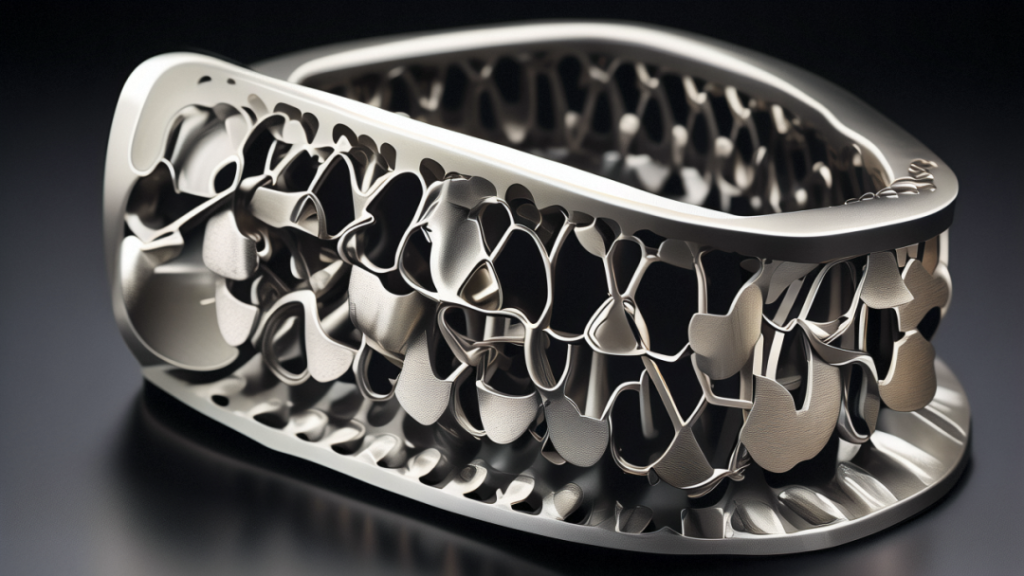
Development and application of medical titanium alloy materials
Medical titanium alloys are widely used in the biomedical field, especially in orthopaedic, dental and cardiovascular implant interventions or instruments due to their outstanding mechanical properties, excellent corrosion resistance and excellent biocompatibility.Compared to stainless steel and cobalt-chromium based alloys, titanium and its alloys are widely used due to their higher strength, lower modulus of elasticity and better biocompatibility.
In recent years, the development of low modulus β-type titanium alloys is still ongoing, while porous titanium-based alloys are being developed as an alternative orthopaedic implant material that can provide good biological fixation through the growth of bone tissue into its porous network.
Beta-type titanium alloys have attracted attention for their low modulus of elasticity and good biocompatibility, and are seen as promising materials for the manufacture of next-generation biomedical implants.The new Ti-Mo alloy not only reduces the elastic modulus but also improves the corrosion resistance and biocompatibility by adding non-toxic elements such as Mo, Si, Zr and Ta.
In addition, nanostructured commercially pure titanium (CPTi) treated by severe plastic deformation (SPD) technology can significantly improve the mechanical properties and bio-responsive activity of the material, providing a new solution for dental implants.
Although the long-lasting safety and functionality of medical titanium alloys in clinical treatments have been satisfied to a certain extent, the further improvement of their biological and mechanical compatibility is still the focus of research.Surface modification techniques are considered to be an effective way to improve the bioactivity, wear resistance and corrosion resistance of medical titanium alloys.For example, by adding active elements to biomedical titanium and titanium alloys, it is possible to significantly reduce the risk of postoperative infections and to develop new biomaterial surfaces with antimicrobial properties.
Medical titanium alloys occupy an important position in the biomedical field due to their unique physicochemical properties.Future research directions include the development of new low-modulus, high-strength, multifunctional and low-cost medical titanium alloy materials, as well as the further enhancement of their biological and mechanical compatibility through surface modification techniques to meet the needs of clinical treatments.Meanwhile, the development of nanostructuring technology and porous materials offers new possibilities to improve the properties of medical titanium alloys.
Latest research progress on medical titanium alloys
Recent research advances in medical titanium alloys have focused on the following areas:
Applications of 3D printing technology
The traditional way of producing medical titanium alloy implants is mainly casting, which is not able to meet the needs of precision medicine with a single product type.3D printing technology shows significant advantages in the field of medical titanium alloys due to its ability to provide diversified processing methods.Especially in the manufacture of porous medical titanium alloys, 3D printing technology can not only realise the design of complex structures, but also adjust the density and porosity of the material according to the needs, so as to better adapt to different clinical needs.
Development of substable beta titanium alloys
Substable β-type titanium alloys are regarded as a key development direction for the new generation of medical titanium alloy materials due to their lower modulus of elasticity and excellent biocompatibility.These materials are characterised by the addition of non-toxic elements such as Nb, Mo, Ta, Zr and Sn.Current research focuses on further reducing the modulus of elasticity and improving the comprehensive properties such as strength, fatigue performance and functional properties.In addition, in-depth research on the interaction mechanism of alloying elements, alloy composition design and organisational property regulation methods as well as micromechanical mechanisms are also important directions in this field.
Research on surface modification technology
Since the surface of medical titanium and titanium alloys is prone to form an inert passivation film, which affects the bonding of implanted devices with hard and soft tissues, surface modification technology has become the key to improve the performance of medical titanium alloys.In recent years, surface modification means such as physical vapour deposition, plasma spraying, ion implantation, laser cladding, and sol-gel synthesis have been widely studied to improve the surface properties of medical titanium and titanium alloys, such as biocompatibility, wear resistance, and antimicrobial properties.



